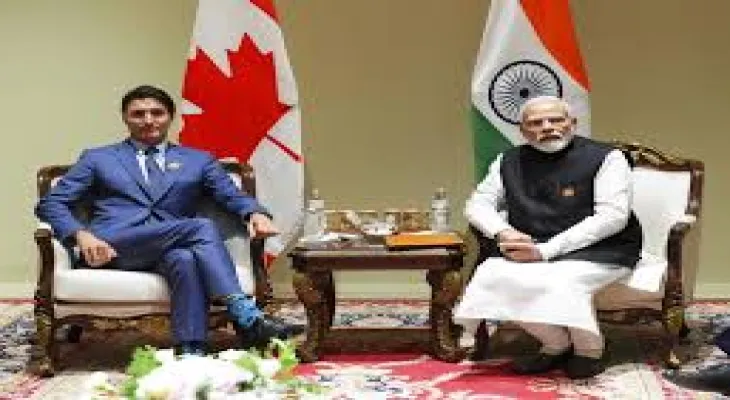Search here
Newspaper
Search here

Arab Canada News
News

Published: April 5, 2024
The Canadian Security Intelligence Service (CSIS) said in documents released late Thursday night that the governments of India and Pakistan attempted to interfere in the Canadian federal elections in 2019 and 2021.
In 2021, the Indian government had "the intent to interfere and likely engage in covert activities," including using an Indian government agent in Canada, according to an unclassified summary written by the Canadian Security Intelligence Service (CSIS).
Two years earlier, in 2019, "Pakistani government officials in Canada attempted to secretly influence Canadian federal politics with the goal of advancing the Pakistani government's interests in Canada," CSIS wrote.
The stark assessments appear in documents submitted as part of the federal foreign interference inquiry. The public inquiry is examining potential interference by China, India, Russia, and other countries in the 2019 and 2021 federal elections.
All reports carry cautionary notes about the possibility that the summaries are unconfirmed, single-sourced, or incomplete, and CSIS Director David Vigneault told the inquiry that intelligence is not necessarily fact and said it may require further investigation.
Pakistan a "limited foreign interference actor"
Foreign interference by the Pakistani government against Canada was "primarily to promote political, security, and economic stability in Pakistan and to counter India's increasing global influence," according to a CSIS assessment, noting that Pakistan was a "limited foreign interference actor" in 2019 and 2021.
During the 2019 election, CSIS said the Canadian government undertook what it called a "threat mitigation measure" ahead of the vote, aimed at "reducing the threat of foreign interference posed by the Pakistani government."
CSIS wrote: "The situation was monitored and assessed to effectively reduce the risk of interference."
CSIS indicated that its intelligence shows the Indian government also interfered in the 2019 and 2021 federal elections.
India supported pro-India candidates
CSIS alleges that in 2021, Indian foreign interference activities "focused on a small number of ridings," noting that the Indian government targeted those campaigns because there was a perception in India that "a portion of Canadian Indian voters were sympathetic to the Khalistani movement or pro-Pakistan political positions."
The Khalistan movement is a separatist movement seeking to establish an independent Sikh state in the Punjab province in northern India, and the Indian government has long asserted that the Punjab independence movement undermines India's national security.
The CSIS summary goes on to say it gathered "a body of intelligence" indicating that "an agent acting on behalf of the Indian government may have attempted to interfere in democratic processes" by providing illegal financial support to pro-India candidates.
CSIS said: "Any such financial contribution may have remained unknown to the candidate."
The CSIS memo does not specify the operations or particular candidates who may have been subject to Indian interference in 2021.
CSIS describes the agent as "a specific individual receiving explicit and/or implicit directives from a foreign state while obscuring the relationship between influence activities and a foreign state."
CSIS explains that agents are based in Canada and do not necessarily belong to a particular diaspora community, and "intelligently engage in advancing the foreign state's objectives under specific conditions."
The documents are a series of unclassified intelligence summaries primarily authored by CSIS, with "input and concurrence" from the Communications Security Establishment — the other Canadian spy agency focused on electronic surveillance — Global Affairs Canada, the Privy Council Office, the Royal Canadian Mounted Police, and Public Safety Canada.
Pakistan and India were not the focus of testimony during this phase of the public inquiry into foreign interference, which began last week. The proceedings were largely directed toward alleged foreign interference by China. But the two South Asian countries appeared in other documents presented to the inquiry.
A general summary for a classified briefing issued by the Canadian Security Intelligence Service to political parties in June 2019 lists India and Pakistan among other government entities that might engage in interference in Canada.
By redacting the word immediately preceding the word "Pakistani" in the sentence, the briefing continues: "Pakistani officials in Canada likely attempted to covertly influence and support Canadian politicians of Pakistani descent, with the aim of advancing Pakistani interests in Canada."
Three of the five paragraphs related to India in that briefing memo were heavily redacted, but they indicate that "Indian officials used a network of contacts, including politicians, academics, businessmen, media personalities, and community leaders, to monitor individuals residing in Canada and working in Canada who are of interest to the Indian government."
CSIS also wrote that it observed "Indian interference activities targeting Canadian Members of Parliament and provincial legislators... beyond the scope of ordinary diplomatic norms."
In July 2021, the Security Intelligence Threat to Elections (SITE) task force — a Canadian government body composed of senior civil servants from the RCMP, CSIS, Global Affairs, and CSE — held a briefing for political parties on lessons learned from the 2019 election.
SITE wrote that in 2019, it observed "foreign interference activities targeting specific groups and candidates regarding the elections, primarily originating from China, and to a lesser extent India and Pakistan, through the use of human agents."
The document went on to say that "none of the activities reached the level warranting criminal investigations."
The document included a section on Pakistan that was completely redacted.
Regarding India, SITE said in this media briefing that the country "actively conducts foreign interference and targets Canadian political figures. Working through Indian officials in Canada, India engages in a range of activities seeking to influence Canadian communities and politicians to advance its political interests and agendas."
"India is interested in engaging expatriates in Canada to shape political outcomes in its favor."
Comments